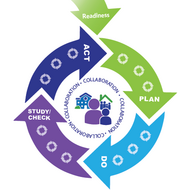Continuous Improvement Process Criteria and Rubric
(View Complete Item Description)This document reflects years of collective expertise and research about what works to lead for equity: to build educational systems and align educator practices in service to each and every student, college and career ready. It explains the why, and what to do to engage in continuous improvement to improve outcomes for all students or for specific student groups. In addition, this is a synthesis common understanding of continuous improvement as an ongoing, data-driven process in which learning organizations deliberately and strategically collaborate to understand and replicate successes, and plan for and address areas of concern. When implemented effectively, the continuous improvement process culminates in long-term, embedded, positive change and progress in the school or district, thereby improving student outcomes (Wisconsin Department of Public Instruction 2016, 6).
Material Type: Other




















